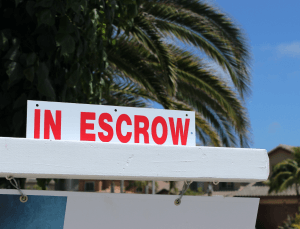Are you looking to buy or sell your home in the near future? If so, you’ll probably hear the word “escrow” pop up at various points along your journey. There’s a good reason for that, too: because escrow is often a critical checkpoint in that journey to buy or sell your house.
So, what exactly is escrow? What does it mean, and how does it work?
 The definition of “escrow”
The definition of “escrow”
The Merriam-Webster dictionary defines escrow as “A deed, a bond, money, or a piece of property held in trust by a third party to be turned over to the grantee only upon fulfillment of a condition.”
Essentially, what that means is that in the middle of the transaction process, someone other than the buyer or seller officially takes possession of a large quantity of money, or the property, until a certain requirement has been met or a task has been completed.
The two types of escrow accounts
An escrow account is used to hold onto money or property throughout the home buying or home selling process in order to protect both sides. With that said, there are two separate kinds of escrow accounts: escrow accounts for home buying, and escrow accounts for taxes and insurance purposes.
Escrow accounts for home buying
Most purchase agreements come attached with an initial deposit requirement, which is also sometimes referred to as “earnest money.” The purpose of this initial deposit is to demonstrate good faith and legitimate interest in purchasing the house. If the buyer has second thoughts about buying the house and is ultimately deemed to be responsible for the potential sale falling through and not happening, the would-be seller usually gets to keep the money.
To best protect the interests of both the buyer and the seller, this “earnest money” is usually held onto by a third-party escrow account. Once the transaction is completed, the earnest money then goes toward the down payment.
Occasionally, the earnest money will stay in an escrow account beyond the date the transaction is completed. Usually, this is done to allow the seller to stay in the house for an additional period of time before they can reasonably move out.
Escrow accounts for taxes and insurance
Following the purchase of a home, you’re going to need money to pay for taxes and insurance. In some cases, your lender may decide to create an escrow account to do so. Once the sale has closed, the lender takes a percentage of the monthly mortgage payment and holds it in the escrow account until it’s time to pay your tax and insurance payments.
In order to ensure that the right amount is being taken from your escrow account each month, your lender will audit your escrow account to make sure that neither party is being cheated. If the lender determines that more money is being taken from the escrow account than is necessary, you will likely qualify for an escrow refund.
Are you looking to buy or sell your home, and looking to find the right realtors to help you do so? Reach out to our team at Drew Sineath & Associates, and we’d be happy to help!

